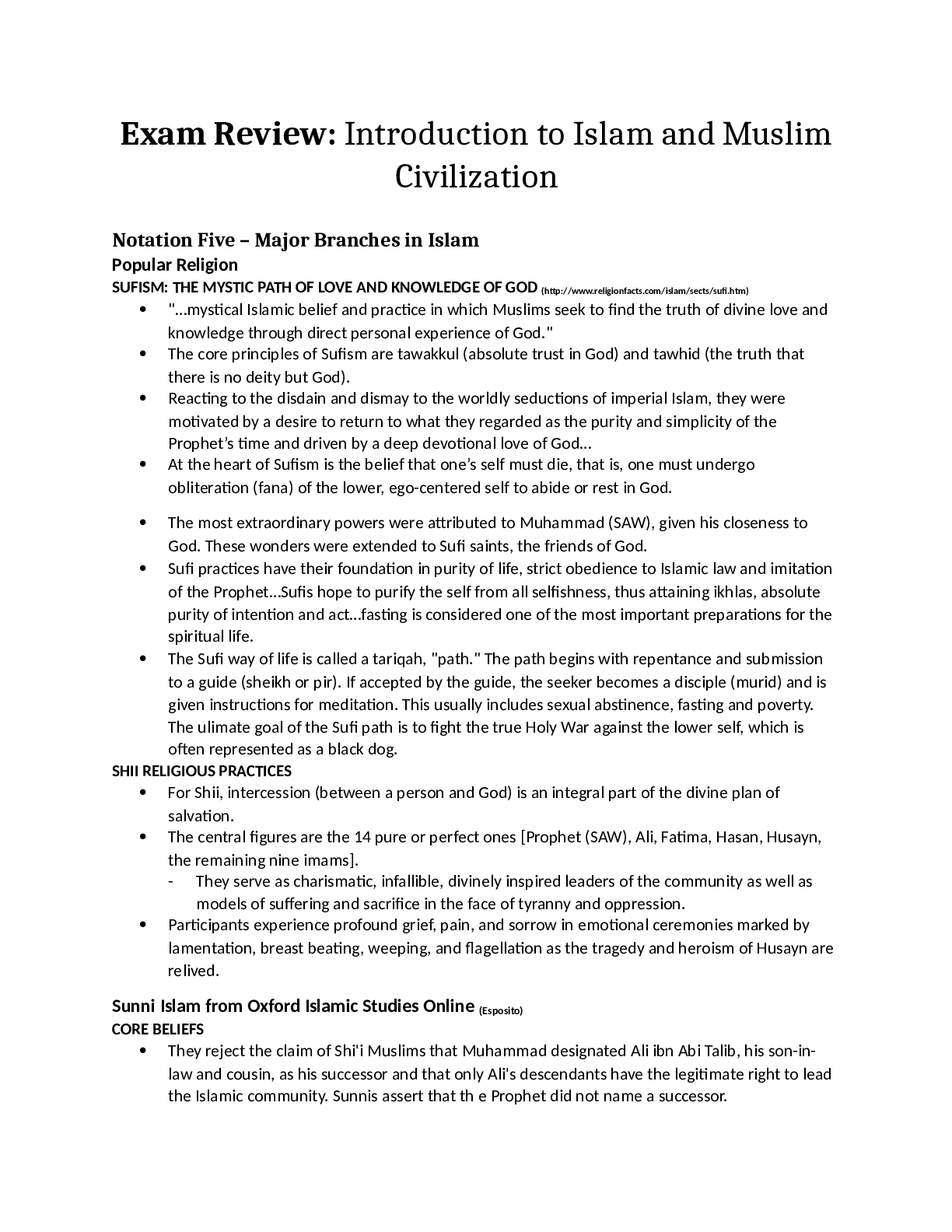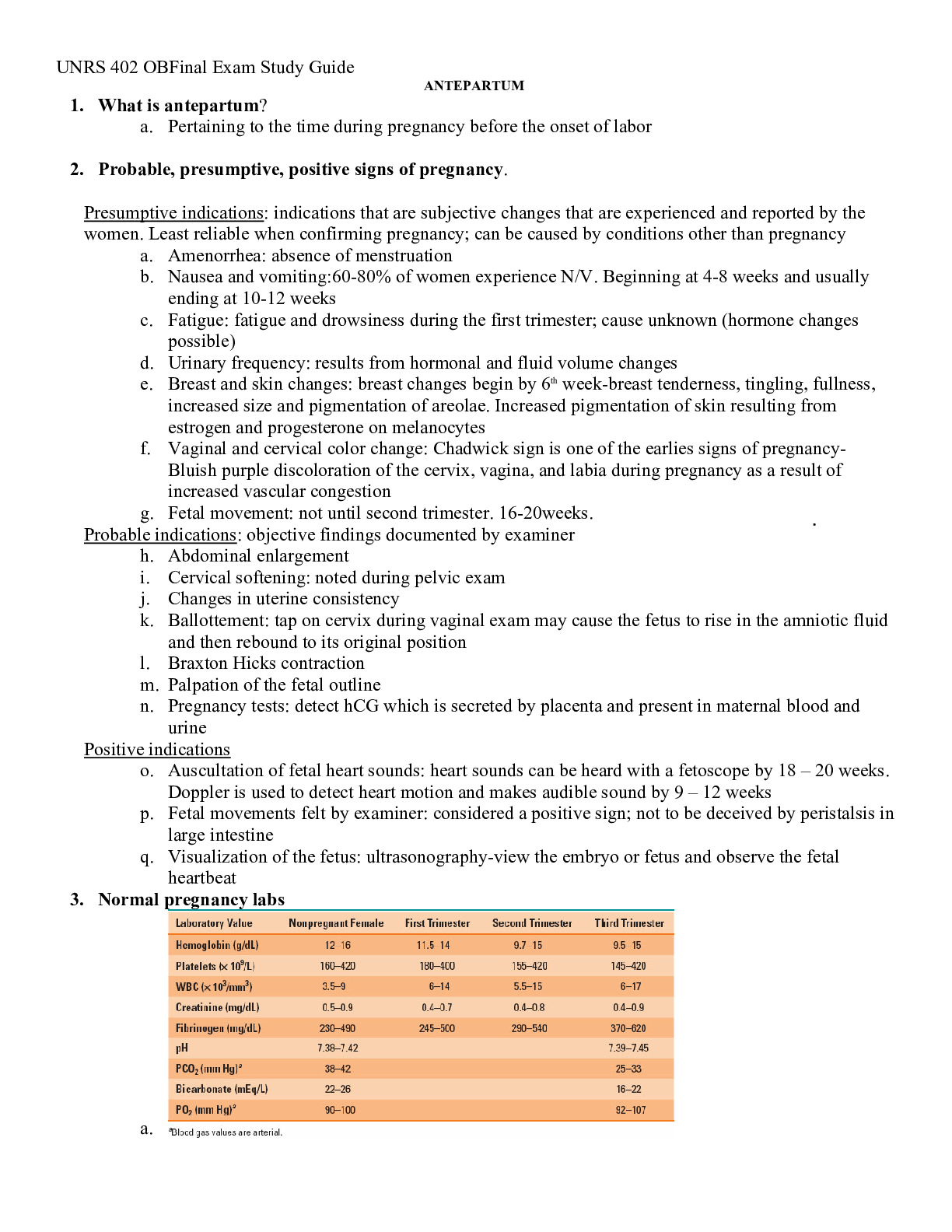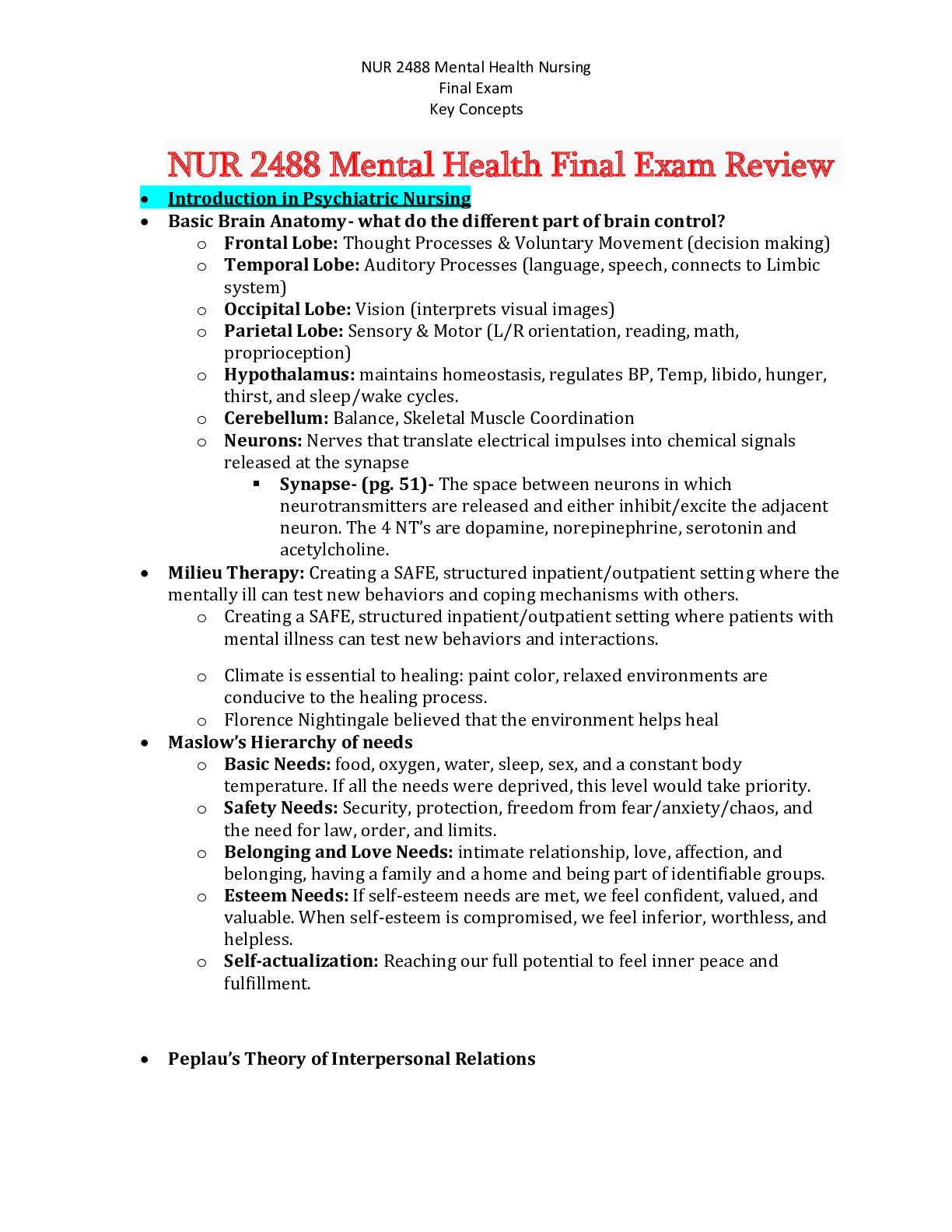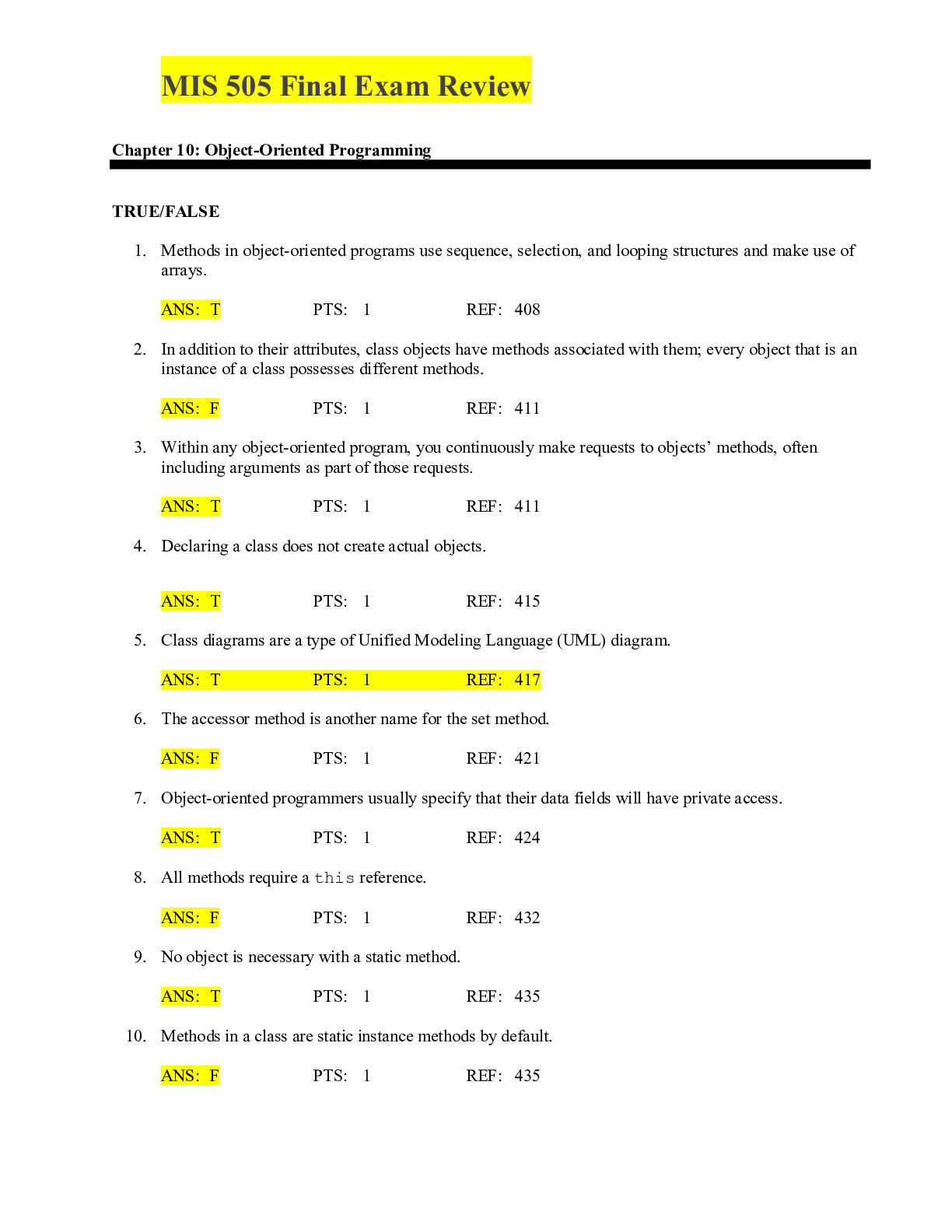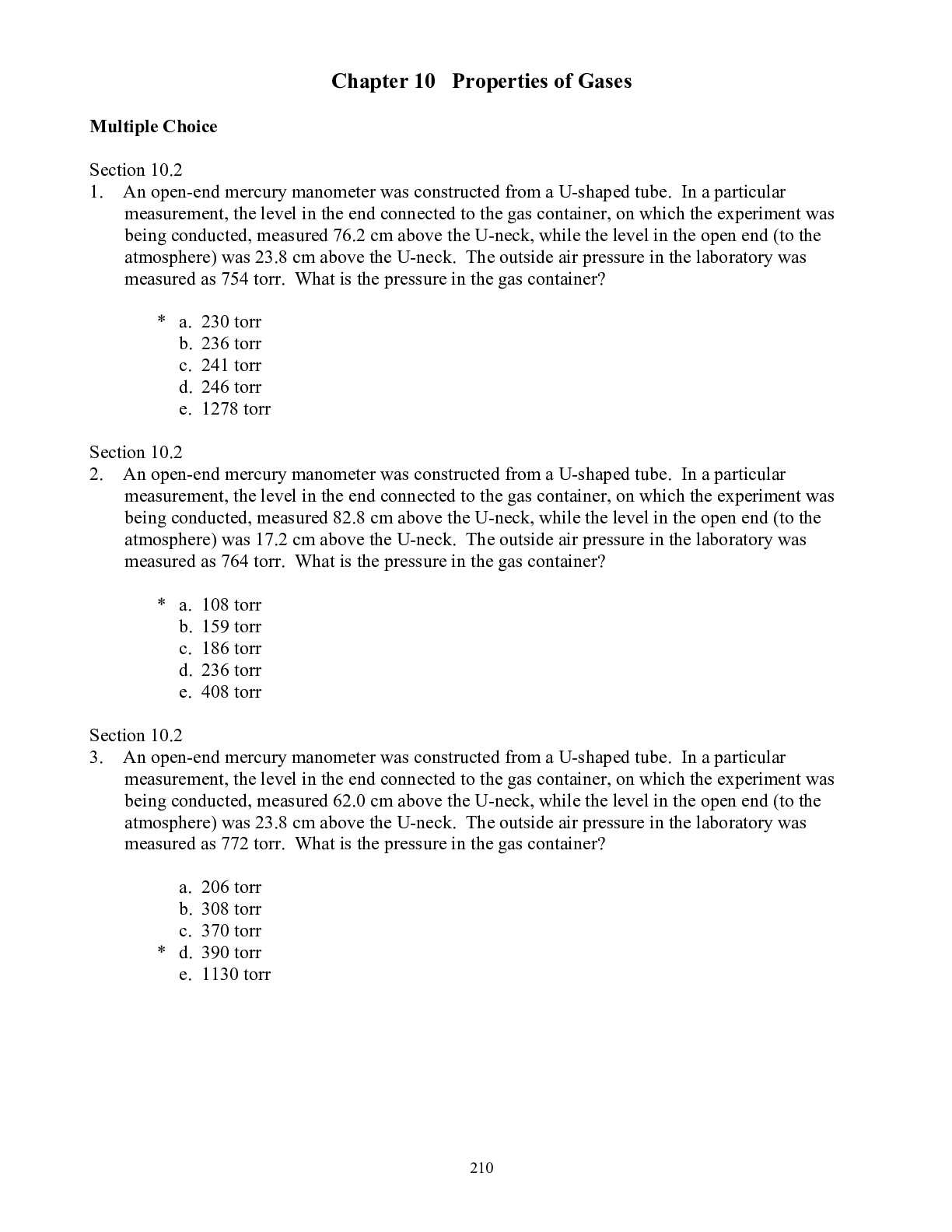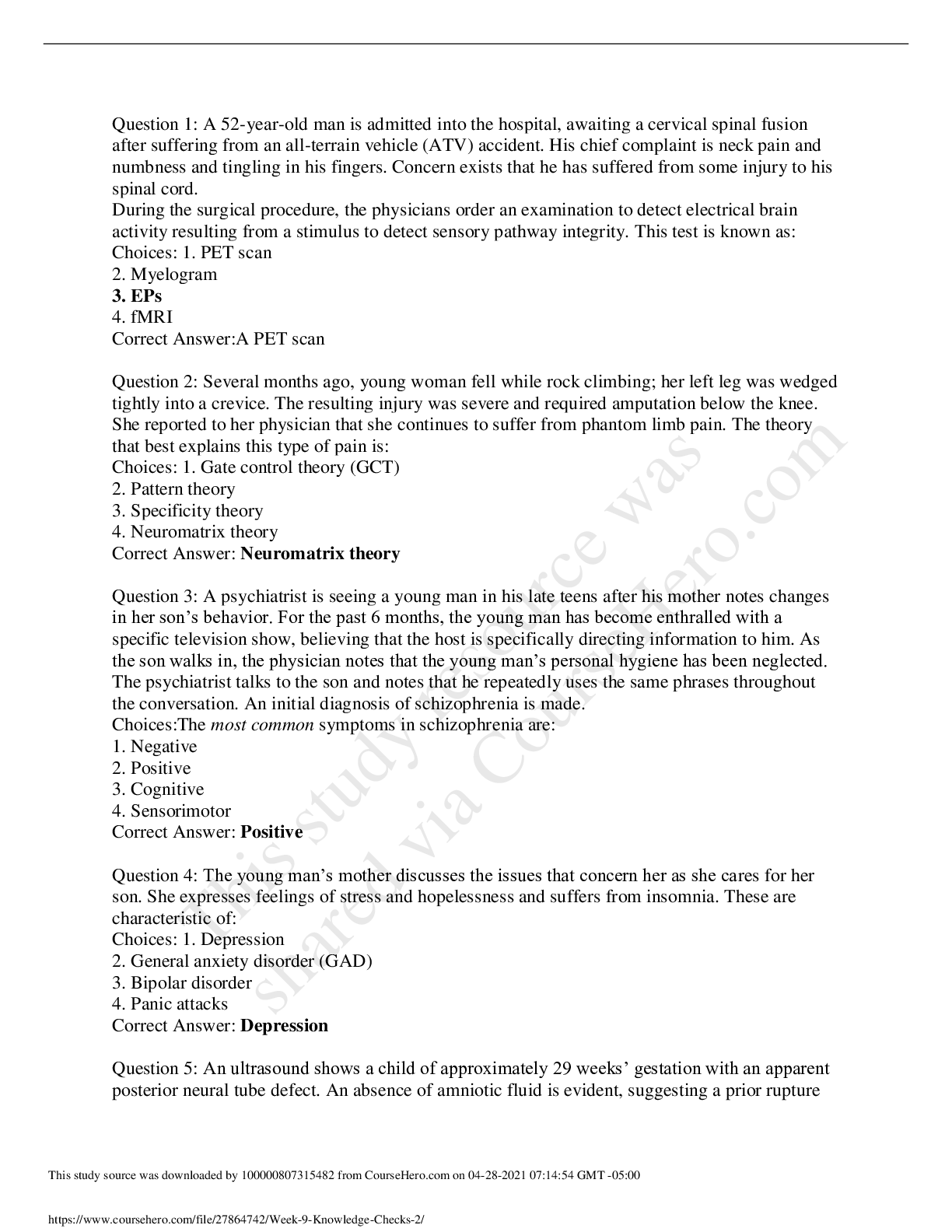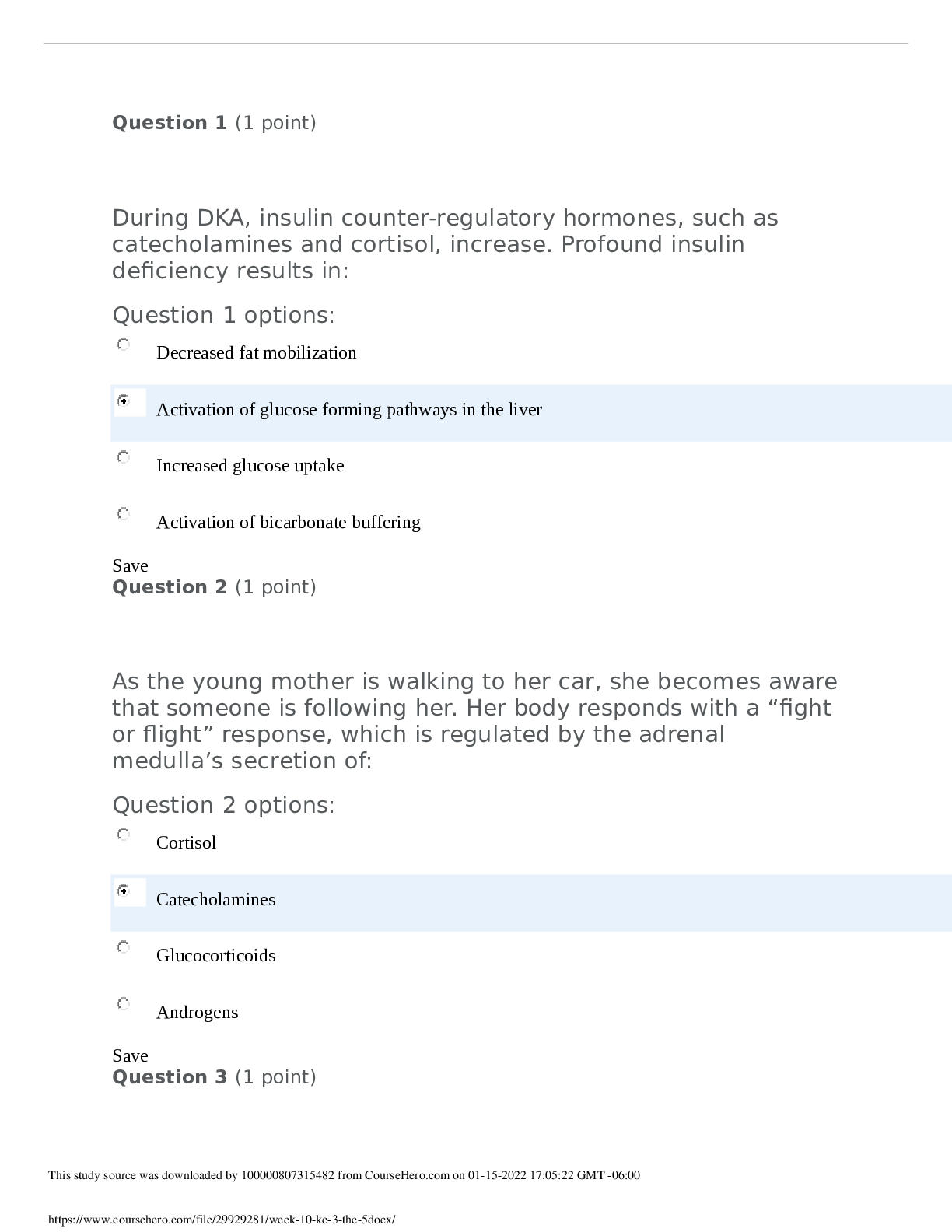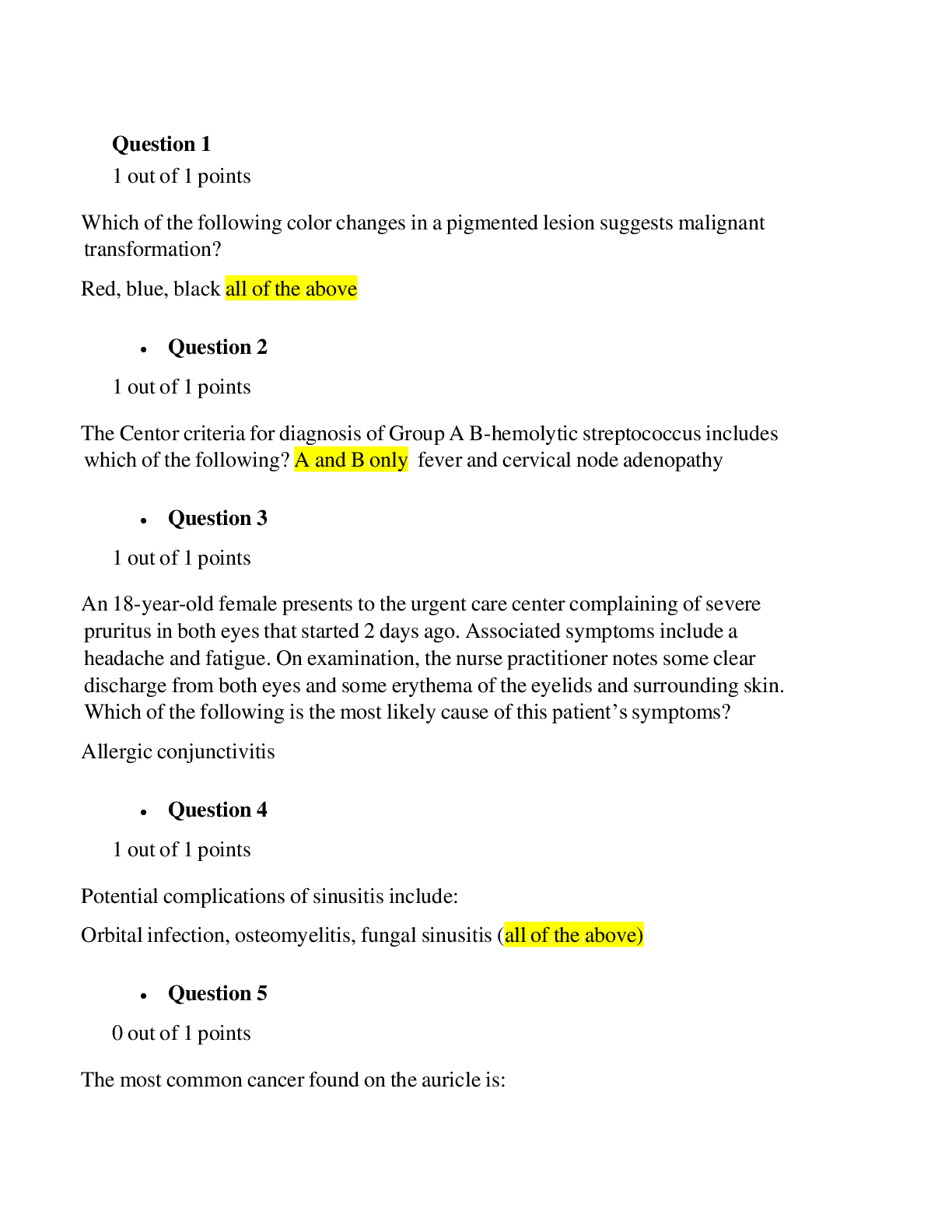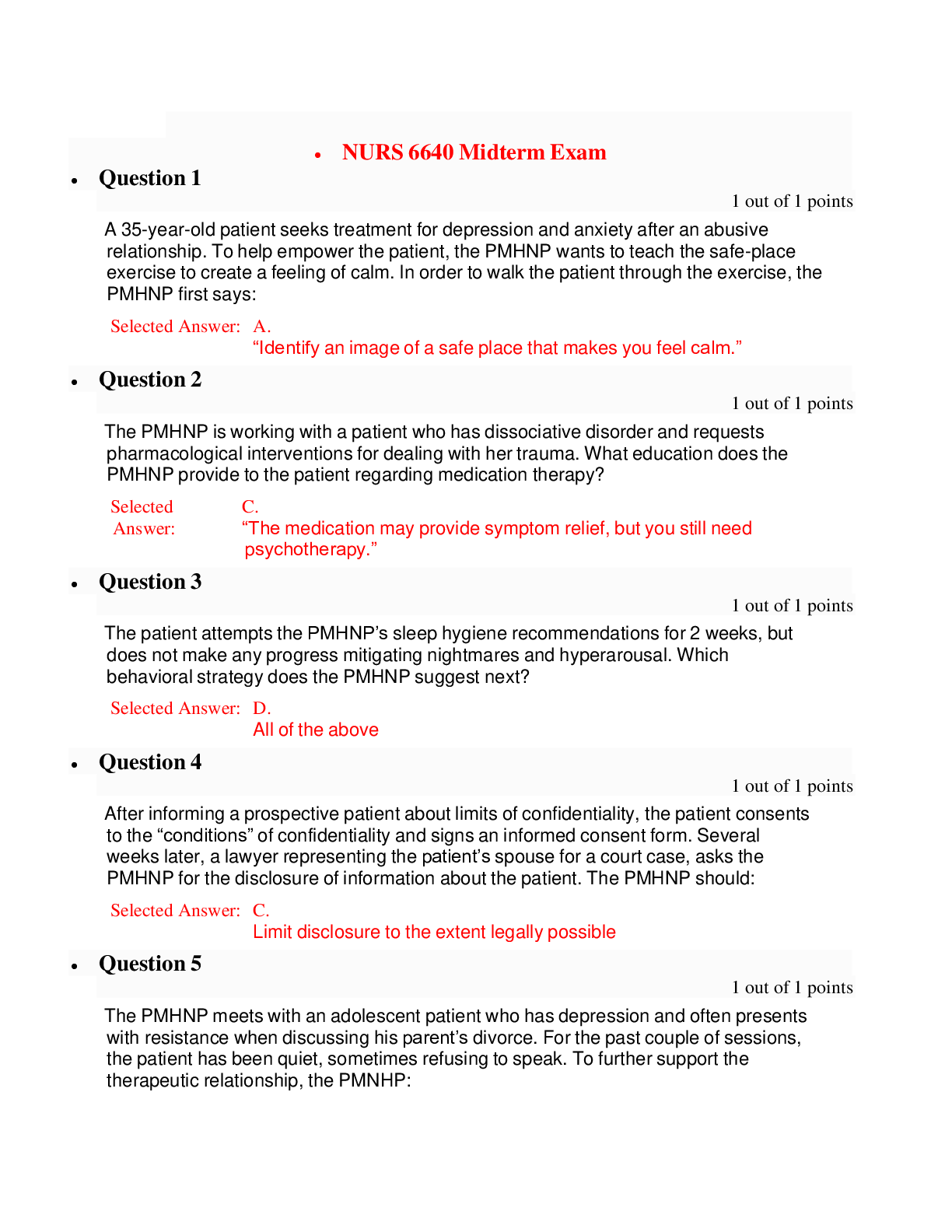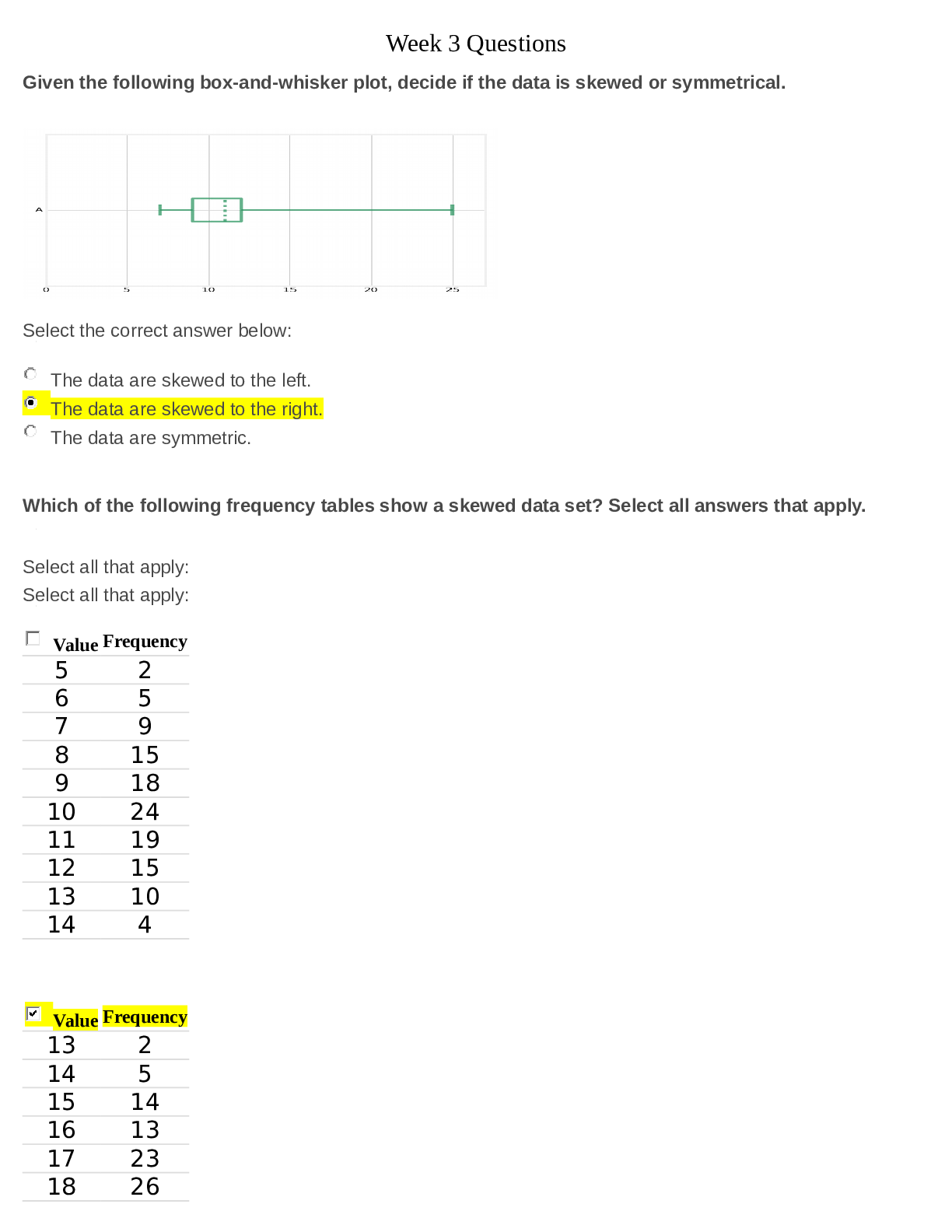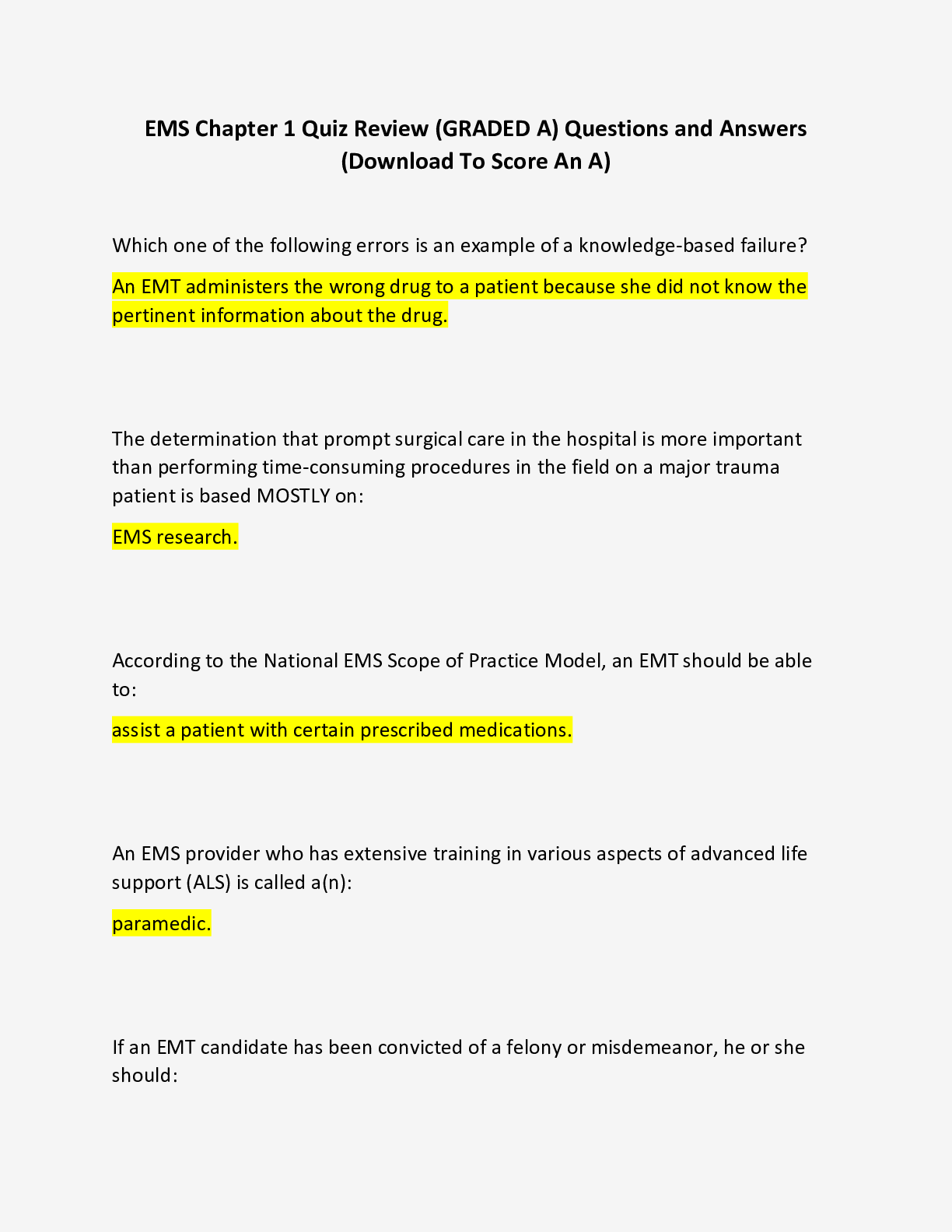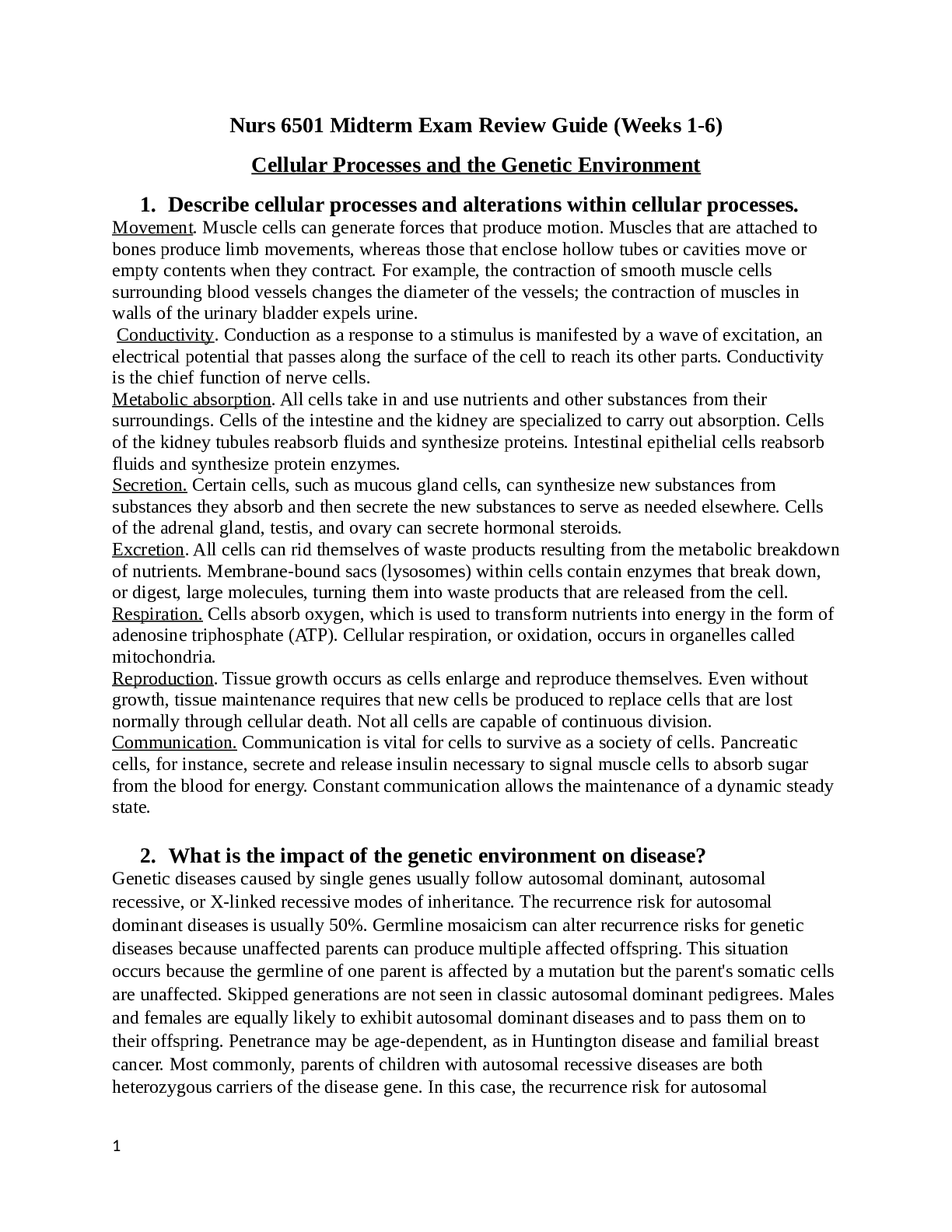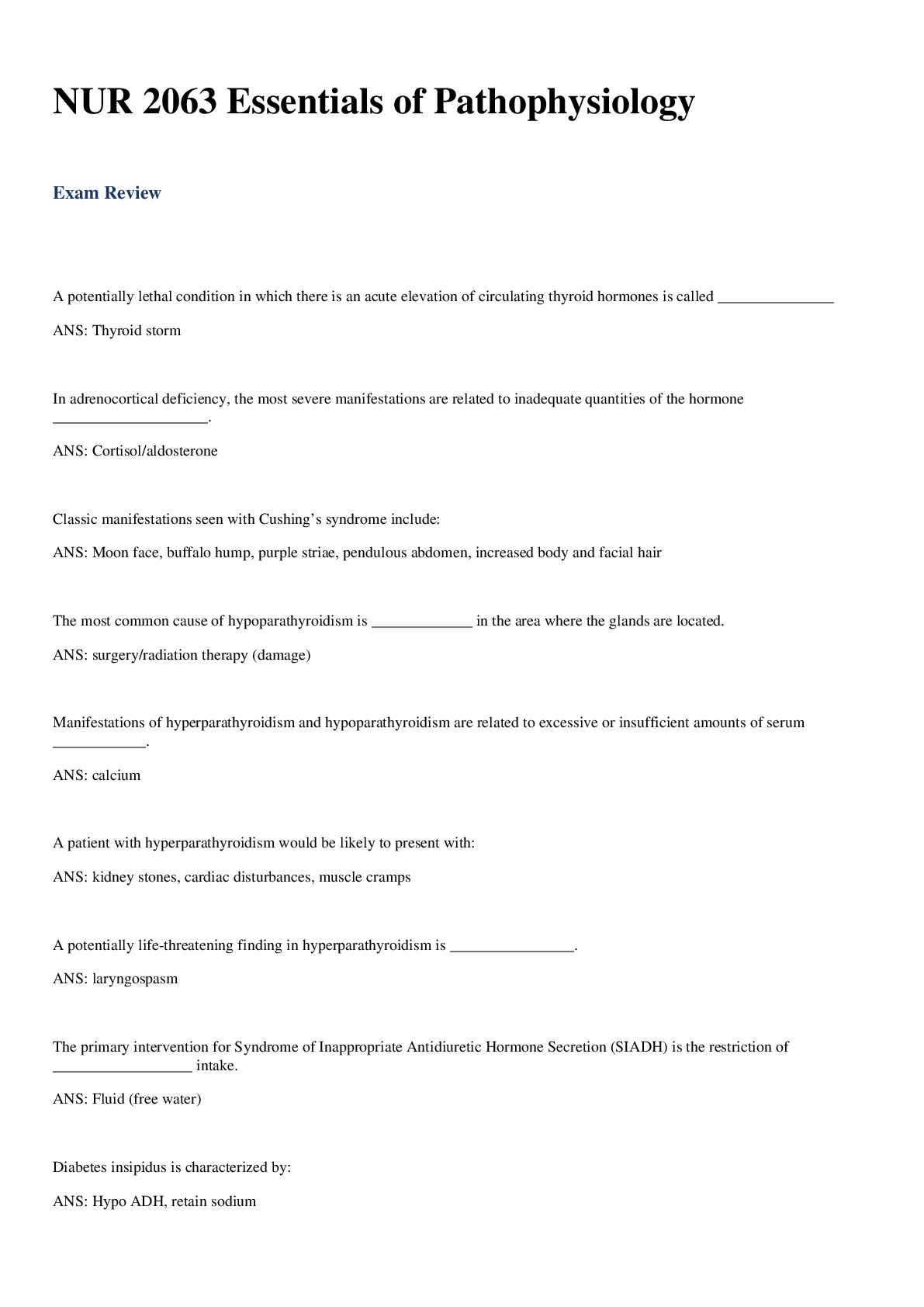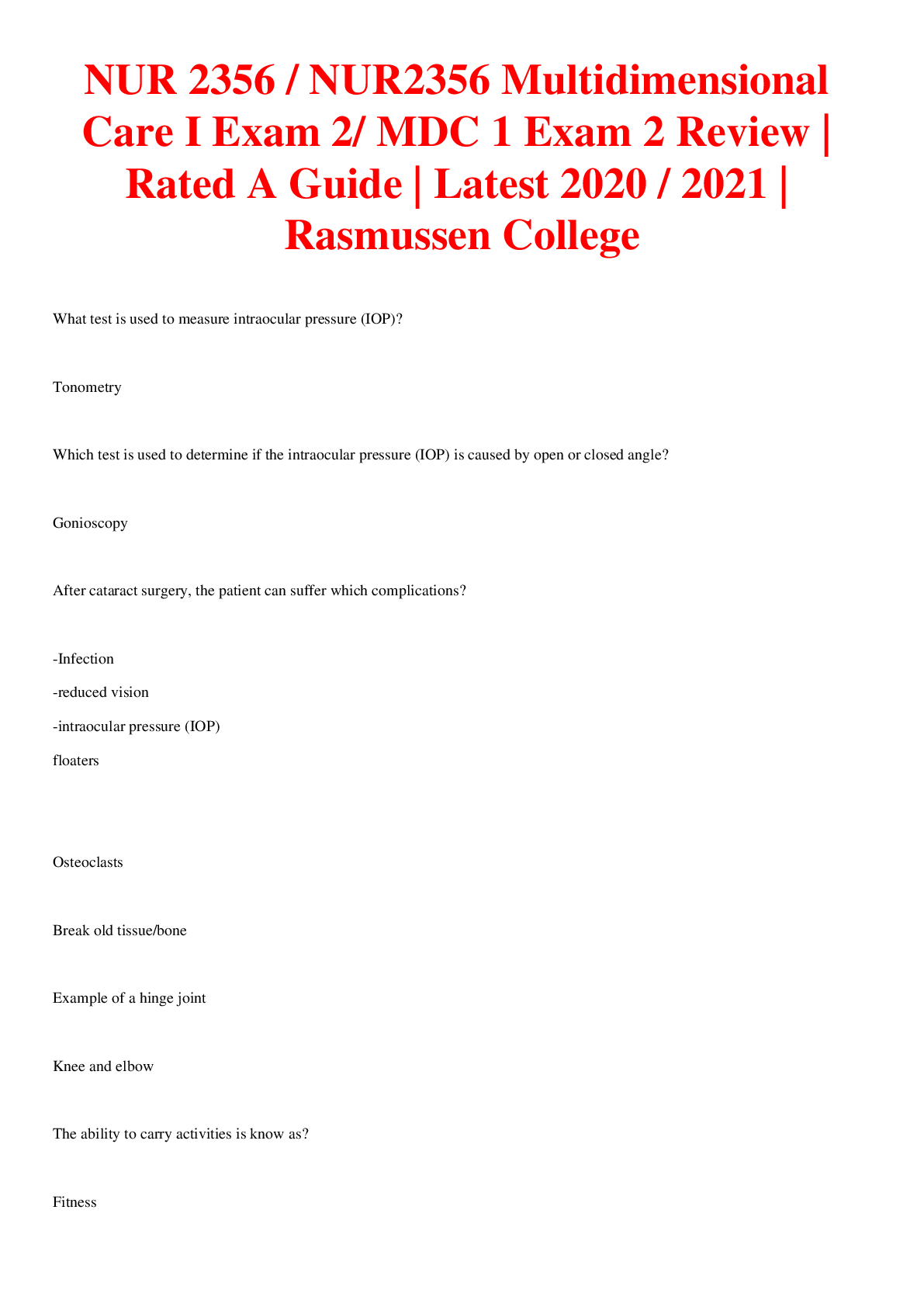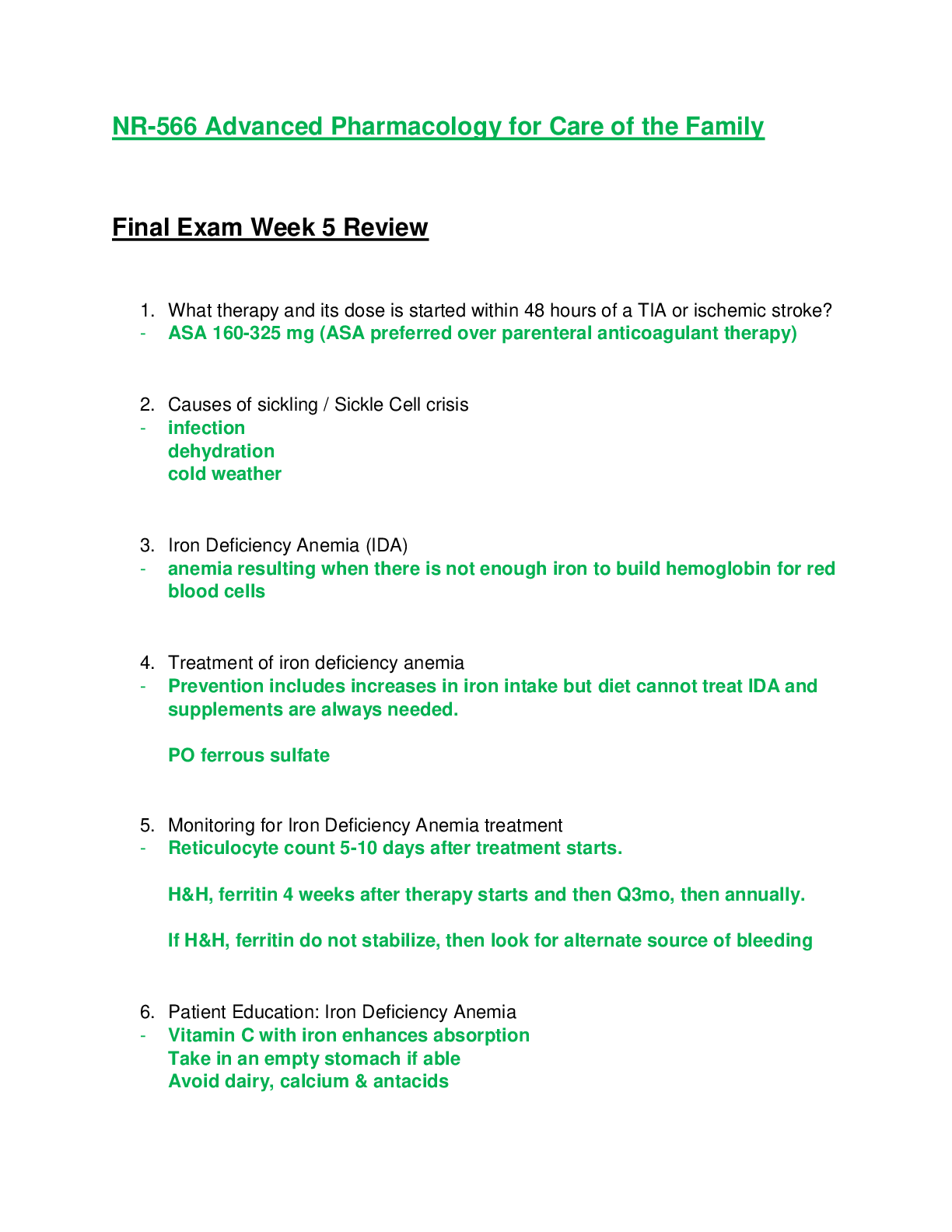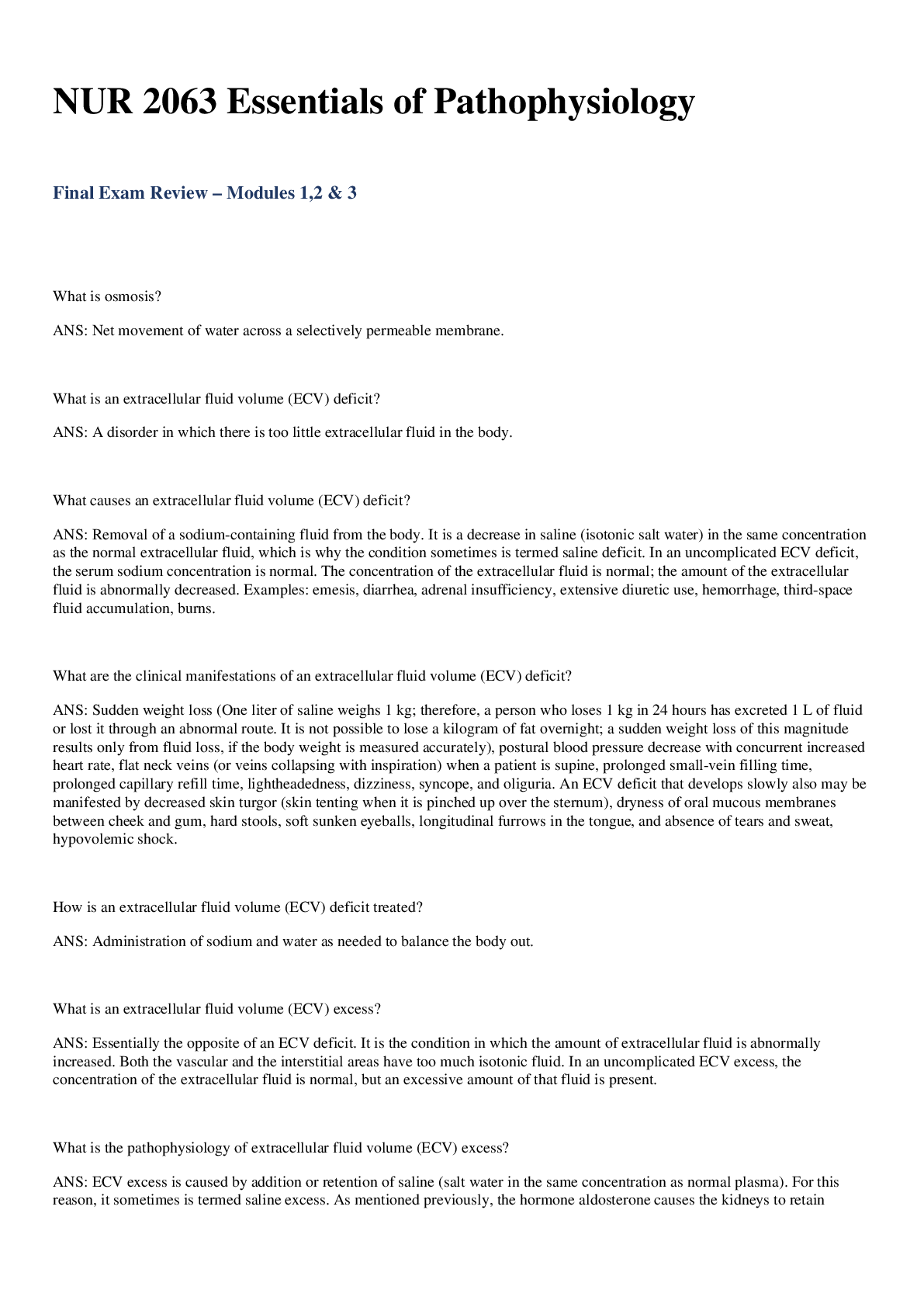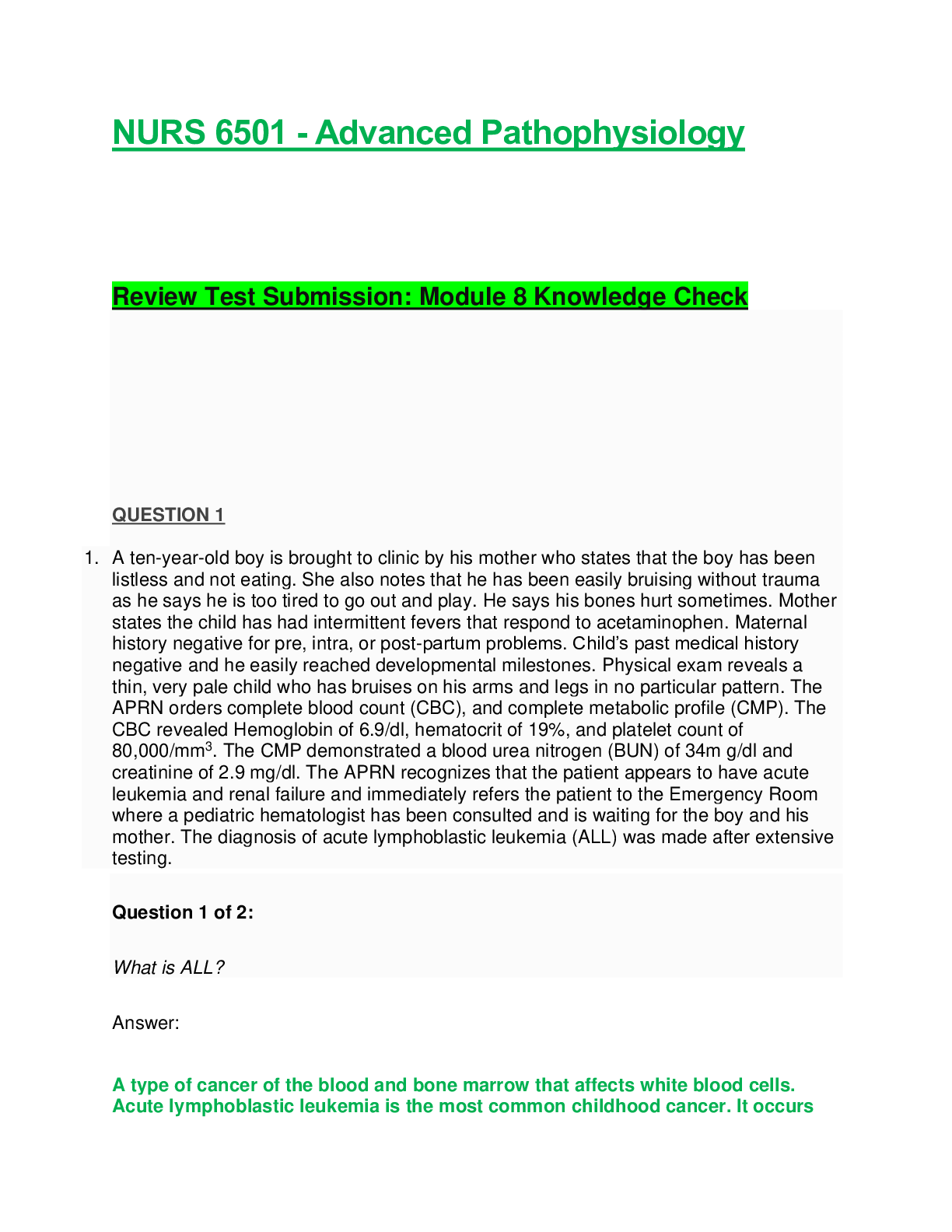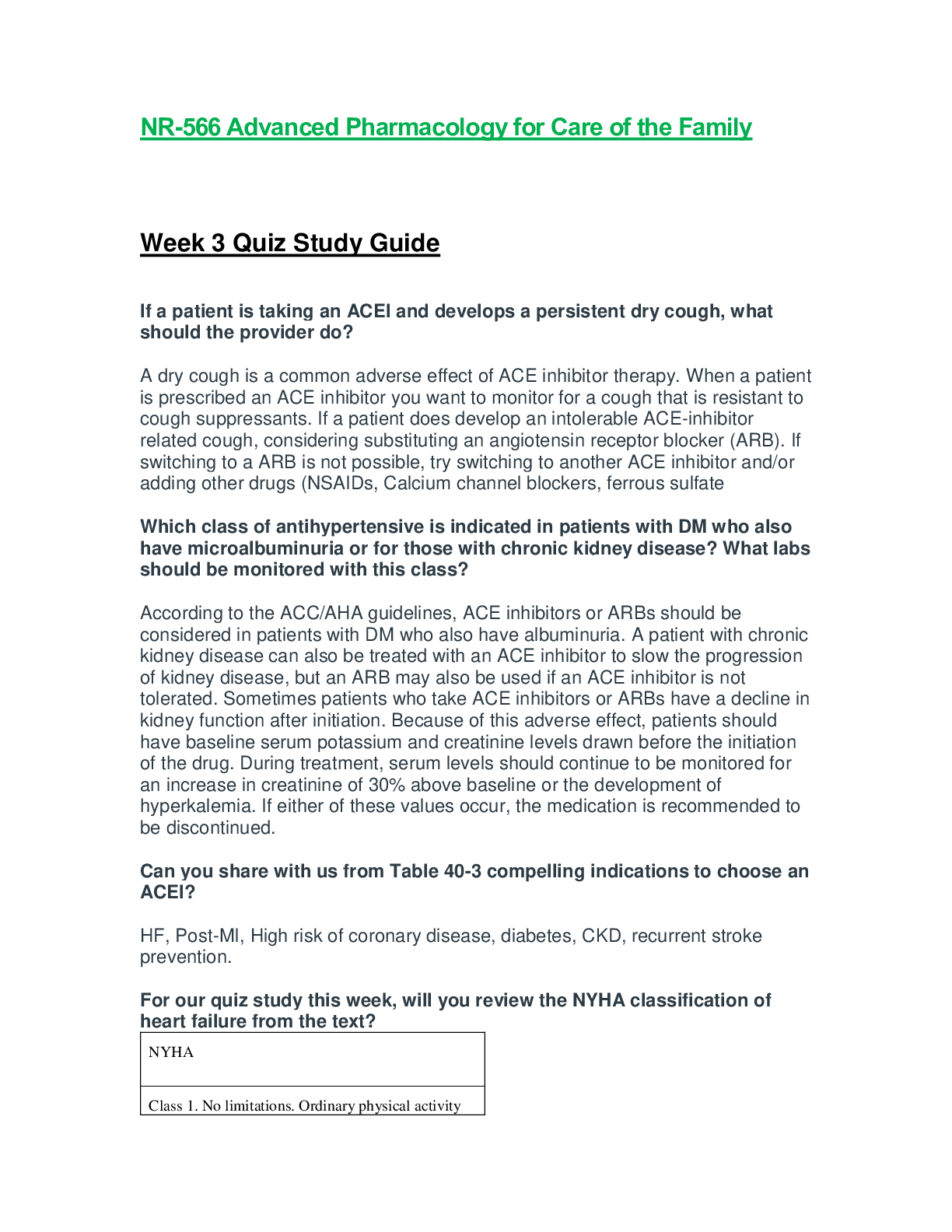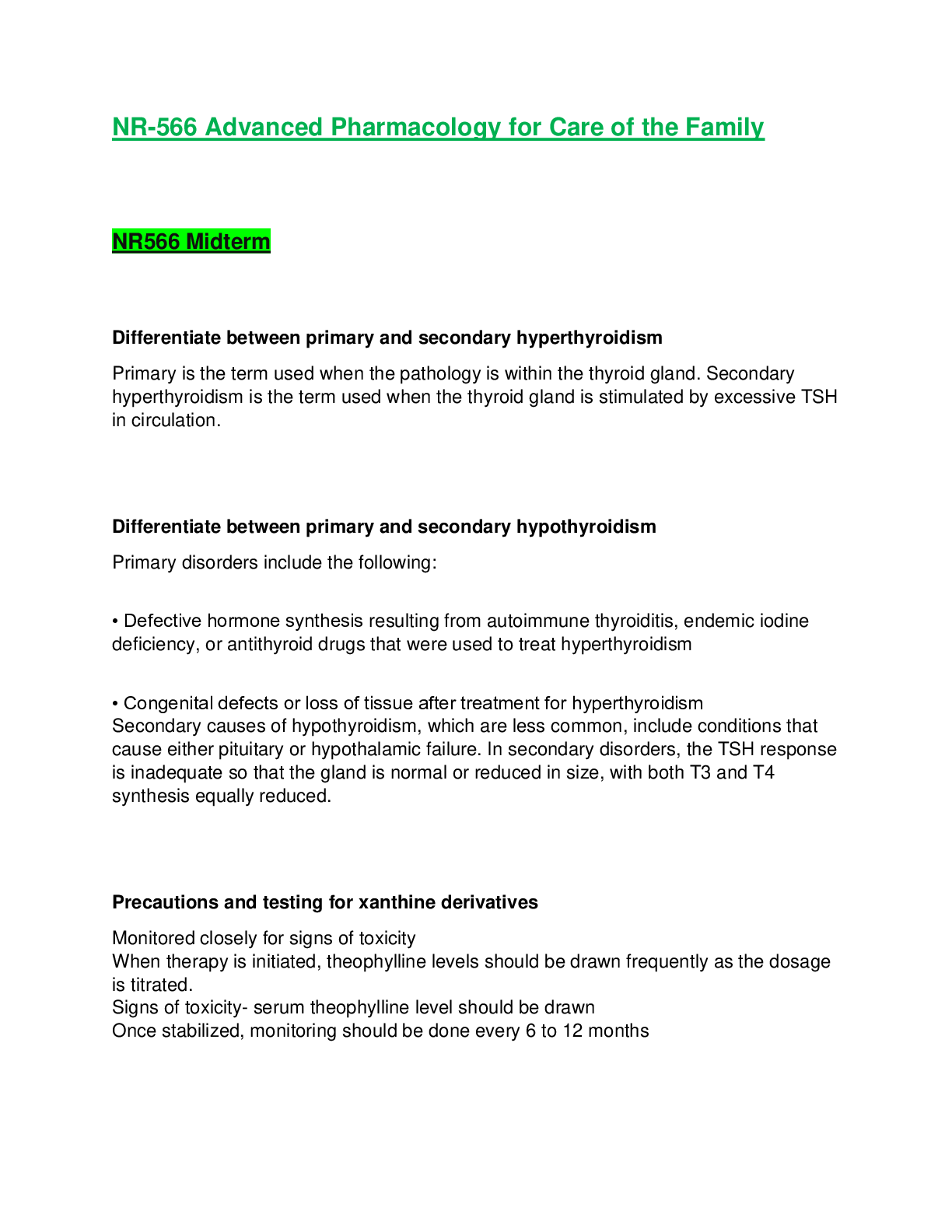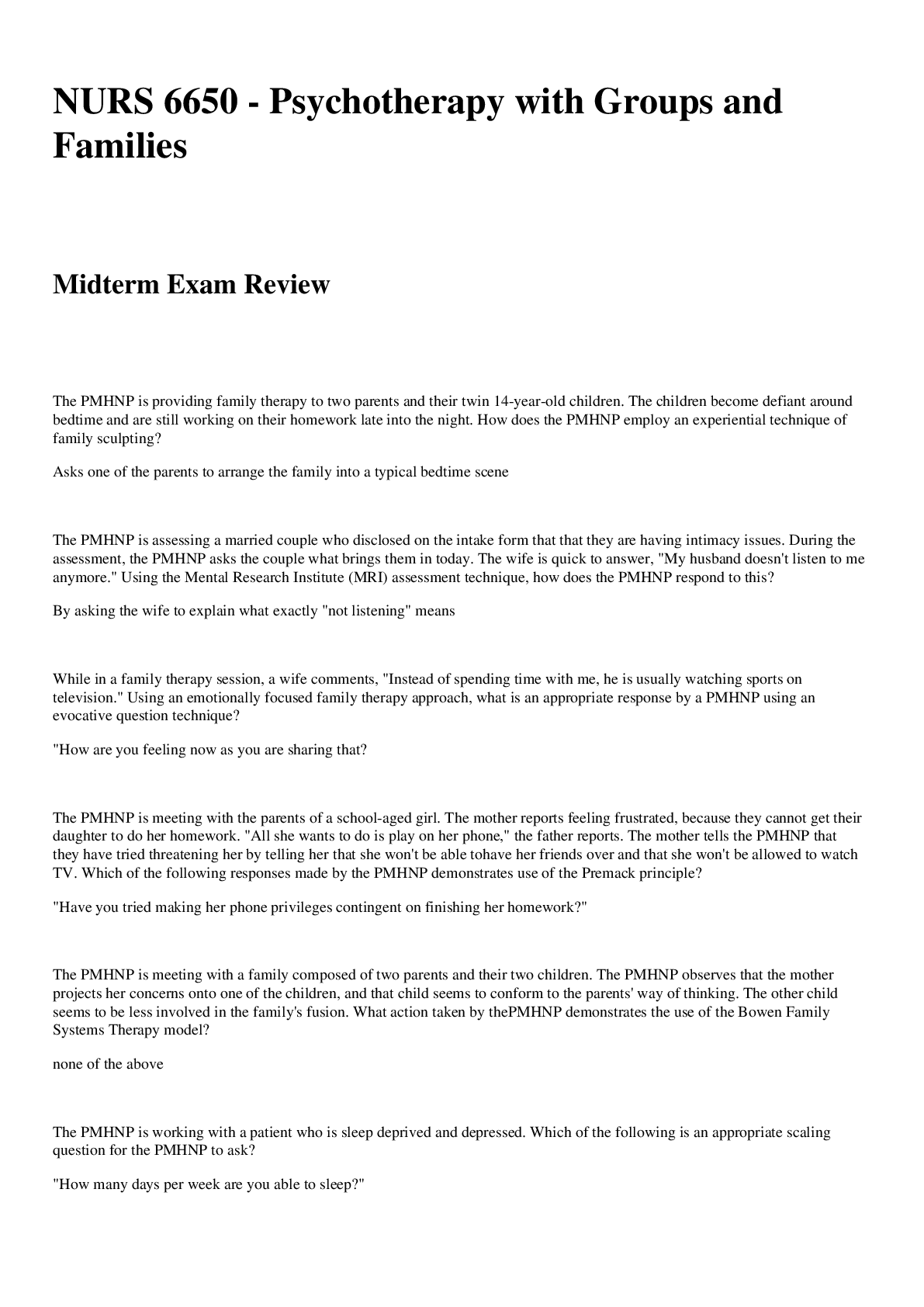Psychology > EXAM REVIEW > Abnormal Psychology Board Exam Reviewer (Download to Score A) (All)
Abnormal Psychology Board Exam Reviewer (Download to Score A)
Document Content and Description Below
Abnormal PsychologyAnn Kring Board Exam Reviewer Nino-Mhar Malana, RPmChapter 1 Introduction and Historical Overview As you approach the study of psychopathology, the field concerned with the na... ture, development,and treatment of mental disorders, keep in mind that the field is continually developing andaddingnewfindings. Stigma refers to the destructive beliefs and attitudes held by a society that are ascribedtogroupsconsidered different in some manner, such as people with mental illness. More specifically, stigma has four characteristics: 1. A label is applied to a group of people that distinguishes them fromothers (e.g., “crazy”). 2. The label is linked to deviant or undesirable attributes by society (e.g., crazypeoplearedangerous). 3. People with the label are seen as essentially different fromthose without thelabel,contributing to an “us” versus “them” mentality (e.g., we are not like those crazy people). 4. People with the label are discriminated against unfairly (e.g., a clinic for crazy peoplecan’tbebuilt in our neighborhood). In 1999, David Satcher, then Surgeon General of the United States, wrote that stigmaisthe“mostformidable obstacle to future progress in the arena of mental illness and mental health”inhisgroundbreaking report on mental illness. Sadly, this remains true more than 10 years later. Many mental health practitioners and advocates hoped that the more people learnedabouttheneurobiological causes of mental disorders, the less stigmatized these disorders wouldbe. However, results from a recent study shows that this may not be true. People’s knowledge has increased,butunfortunately stigma has not decreased. Defining Mental Disorder The definition of mental disorder presented in the fourth edition of the American diagnosticmanual,theDiagnostic and Statistical Manual of Mental Disorders (DSM-IV-TR), as well as the proposeddefinitionfor the fifth edition of the DSM (DSM-5), which is scheduled for release in May 2013, includesanumberof characteristics essential to the concept of mental disorder, including the following: 1. The disorder occurs within the individual. 2. It causes personal distress or disability. 3. It is not a culturally specific reaction to an event (e.g., death of a loved one). 4. It is not primarily a result of social deviance or conflict with society. Personal Distress One characteristic used to define mental disorder is personal distress—that is, a person’sbehaviormay be classified as disordered if it causes him or her great distress. Personal distress also characterizes many of the forms of mental disorder consideredinthisbook—people experiencing anxiety disorders and depression suffer greatly. But not all mental disorders cause distress. For example, an individual with the antisocial typeofpersonality disorder may treat others coldheartedly and violate the lawwithout experiencinganyguilt, remorse, anxiety, or other type of distress. And not all behavior that causes distress is disordered—for example, the distress of hungerduetoreligious fasting or the pain of childbirth. Disability Disability—that is, impairment in some important area of life (e.g., workor personalrelationships)—can also characterize mental disorder. For example, substance use disorders are defined in part by the social or occupational disability(e.g.,serious arguments with one’s spouse or poor work performance) created by substance abuse. Being rejected by peers, as Felicia was, is also an example of this characteristic. Phobiascanproduce both distress and disability—for example, if a severe fear of flying prevents someonelivingin California from taking a job in New York. Like distress, however, disability alone cannot be used to define mental disorder, becausesome,butnot all, disorders involve disability. For example, the disorder bulimia nervosa involves bingeeatingand compensatory purging (e.g., vomiting) in an attempt to control weight gain but does not necessarilyinvolve disability. Many people with bulimia lead lives without impairment, while bingeingandpurgingin private. Violation of Social Norms This way of defining mental disorder is both too broad and too narrow. For example, it is toobroadinthat criminals violate social norms but are not usually studied within thedomainofpsychopathology; it is too narrow in that highly anxious people typicallydonotviolatesocial norms. Also, of course, social norms vary a great deal across cultures and ethnic groups, sobehaviorthatclearly violates a social norm in one group may not do so at all in another. Dysfunction In an influential and widely discussed paper, Wakefield proposed that mental disorderscouldbedefined as harmful dysfunction. A judgment that a behavior is harmful requires some standard, and this standardislikelytodepend on social norms and values, the characteristic just described. Dysfunctions are said to occur when an internal mechanism is unable to performitsnaturalfunction—that is, the function that it evolved to perform. Clearly, like the other definitions of mental disorder, Wakefield’s concept of harmful dysfunctionhasitslimitations. The DSM definition of dysfunction refers to the fact that behavioral, psychological,andbiological dysfunctions are all interrelated. That is, the brain impacts behavior, and behavior impactsthebrain; thus dysfunction in these is interrelated. This broadening does not entirely avoidtheproblemsthat Wakefield’s definition suffers from, but it is an attempt that formally recognizes thelimitsofourcurrent understanding. History of Psychopathology Early Demonology Many early philosophers, theologians, and physicians who studied the troubled mindbelievedthatdisturbed behavior reflected the displeasure of the gods or possession by demons. The doctrine that an evil being or spirit can dwell within a person and control his or her mindandbodyis called demonology. The belief that odd behavior was caused by possession led to treating it by exorcism, theritualisticcasting out of evil spirits. Exorcism typically took the form of elaborate rites of prayer, noisemaking,forcing the afflicted to drink terrible-tasting brews, and on occasion more extreme measures, suchasflogging and starvation, to render the body uninhabitable to devils. Early Biological Explanations In the fifth century b.c., Hippocrates, often called the father of modern medicine, separatedmedicine from religion, magic, and superstition. He rejected the prevailing Greek belief that thegodssent mental disturbances as punishment and insisted instead that such illnesses had natural causesandhence should be treated like other, more common maladies, such as colds and constipation. Hippocrates regarded the brain as the organ of consciousness, intellectual life, and emotion; thus,hethought that disordered thinking and behavior were indications of some kind of brainpathology.Hippocrates is often considered one of the earliest proponents of the notion that somethingwrongwiththe brain disturbs thought and action. Hippocrates regarded the brain as the organ of consciousness, intellectual life, and emotion; thus,hethought that disordered thinking and behavior were indications of some kind of brain pathology. Hippocrates classified mental disorders into three categories: mania, melancholia, andphrenitis,or brain fever. Further, Hippocrates believed that normal brain functioning, and therefore mental health, dependedon a delicate balance among four humors, or fluids of the body, namely, blood, blackbile, yellowbile, and phlegm. An imbalance of these humors produced disorders. If a person was sluggish and dull, for example, the body supposedly contained a preponderanceof phlegm. A preponderance of black bile was the explanation for melancholia; toomuch yellow bile explained irritability and anxiousness; and too much blood, changeabletemperament. The Dark Ages and Demonology Historians have often pointed to the death of Galen, the second-century Greek who is regardedasthelast great physician of the classical era, as the beginning of the so-called Dark Ages in westernEuropeanmedicine and in the treatment and investigation of mental disorders. The Church gained in influence, and the papacy was declared independent of the state. Christianmonasteries, through their missionary and educational work, replaced physicians as healersandasauthorities on mental disorder. The Persecution of Witches In 1484, Pope Innocent VIII exhorted the clergy of Europe to leave no stone unturnedinthesearch for witches. He sent two Dominican monks to northern Germany as inquisitors. Twoyearslater they issued a comprehensive and explicit manual, Malleus Maleficarum(“thewitches’hammer”), to guide the witch hunts. Those accused of witchcraft should be tortured if they did not confess, thoseconvictedandpenitent were to be imprisoned for life, and those convicted and unrepentant weretobehandedover to the law for execution. The manual specified that a person’s sudden loss of reason was a symptomof demonicpossessionand that burning was the usual method of driving out the supposed demon. In the dunking test, if the woman did not drown, she was considered to be inleaguewiththedevil (and punished accordingly); this is the ultimate no-win situation. Lunacy Trials In all the cases that Neugebauer examined, only one referred to demonic possession. Interestingly,the term lunacy comes from a theory espoused by the Swiss physician Paracelsus, whoattributedodd behavior to a misalignment of the moon and stars (the Latin word for “moon” is luna).Thislunar explanation, even if unsubstantiated, was a welcome alternative to explanationsinvolvingdemons or witches. Even today, many people believe that a full moon is linked tooddbehavior;however, there is no scientific evidence to support this belief. Development of Asylums Until the fifteenth century, there were very few hospitals for people with mental illness inEurope.However, there were many hospitals for people with leprosy—for example, in the twelfthcentury,England and Scotland had 220 leprosy hospitals serving a total population of a million andahalf. Leprosygradually disappeared from Europe, probably because with the end of wars came a breakwiththeEastern sources of the infection. With hospitals now underused, attention seems tohaveturnedtopeople with mental illness. Leprosariums were converted to asylums, refugesfortheconfinement and care of people with mScore A) [Show More]
Last updated: 1 year ago
Preview 1 out of 86 pages
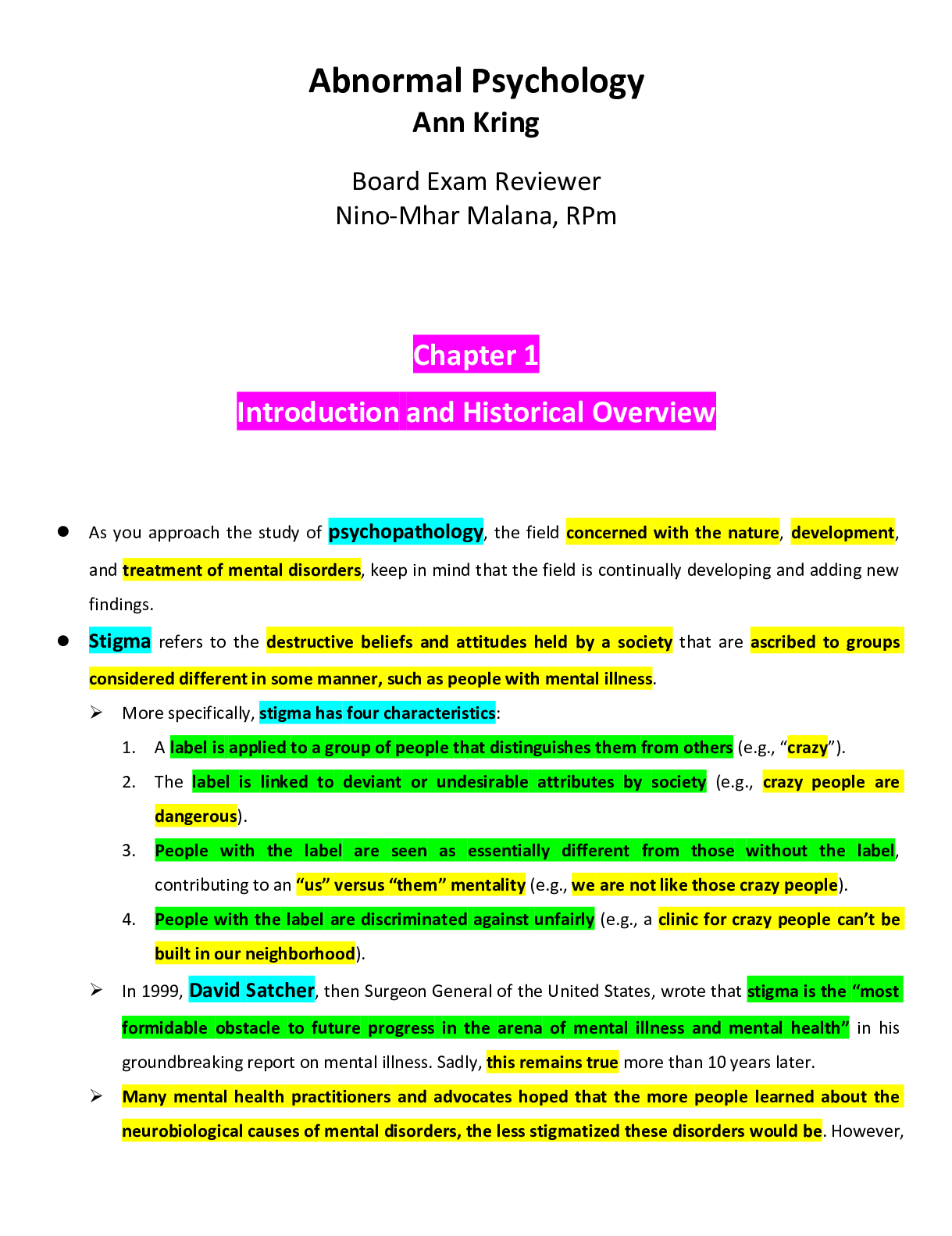
Reviews( 0 )
Document information
Connected school, study & course
About the document
Uploaded On
May 04, 2022
Number of pages
86
Written in
Additional information
This document has been written for:
Uploaded
May 04, 2022
Downloads
0
Views
283


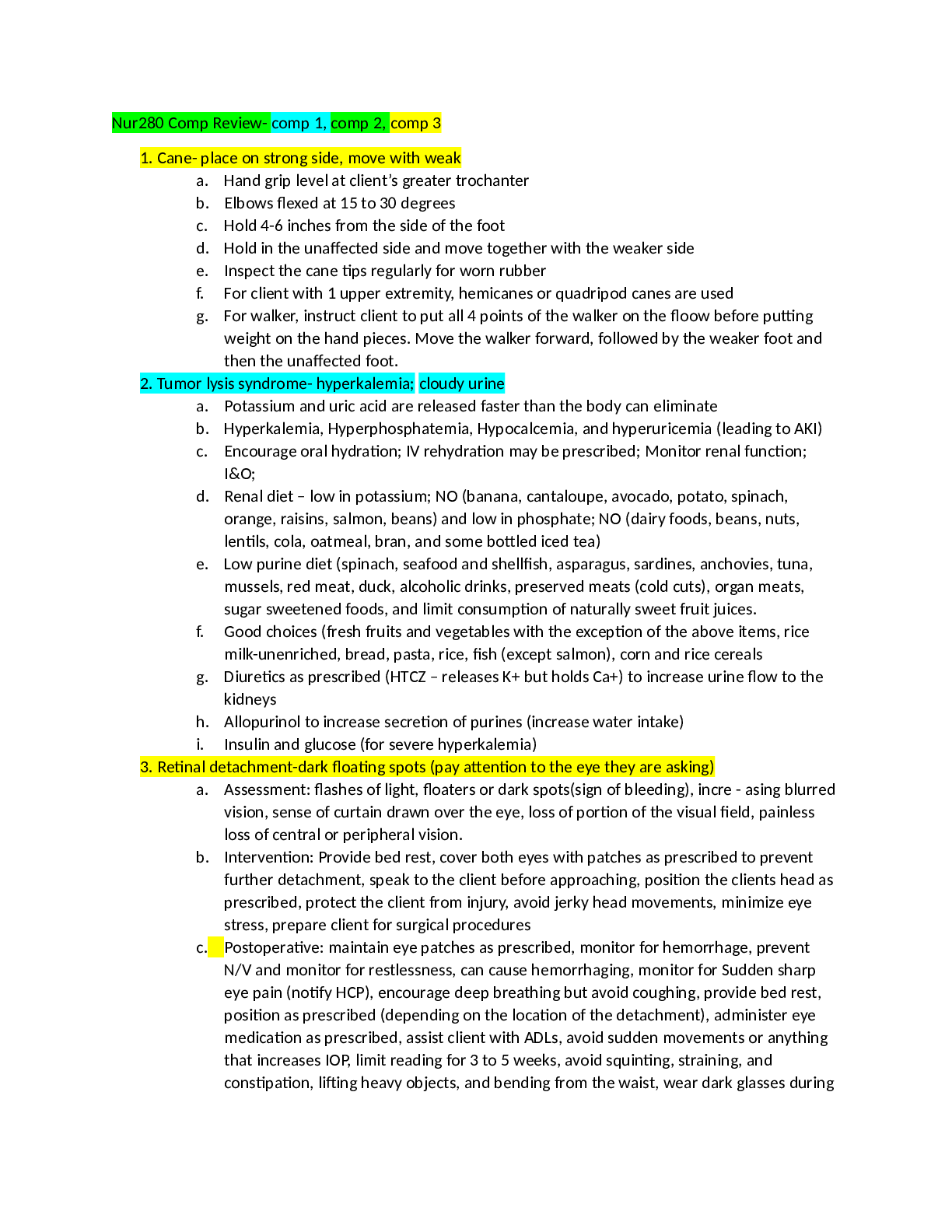
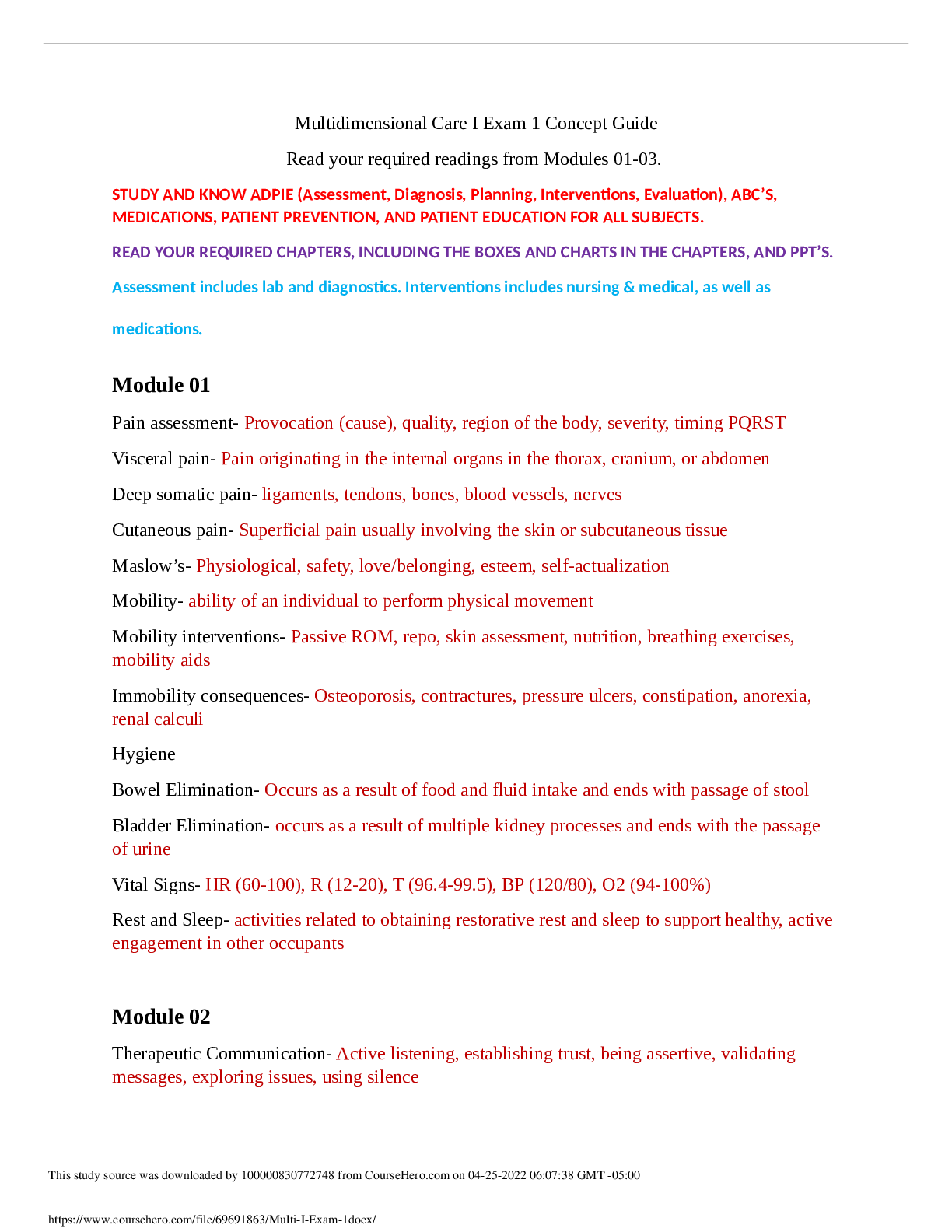
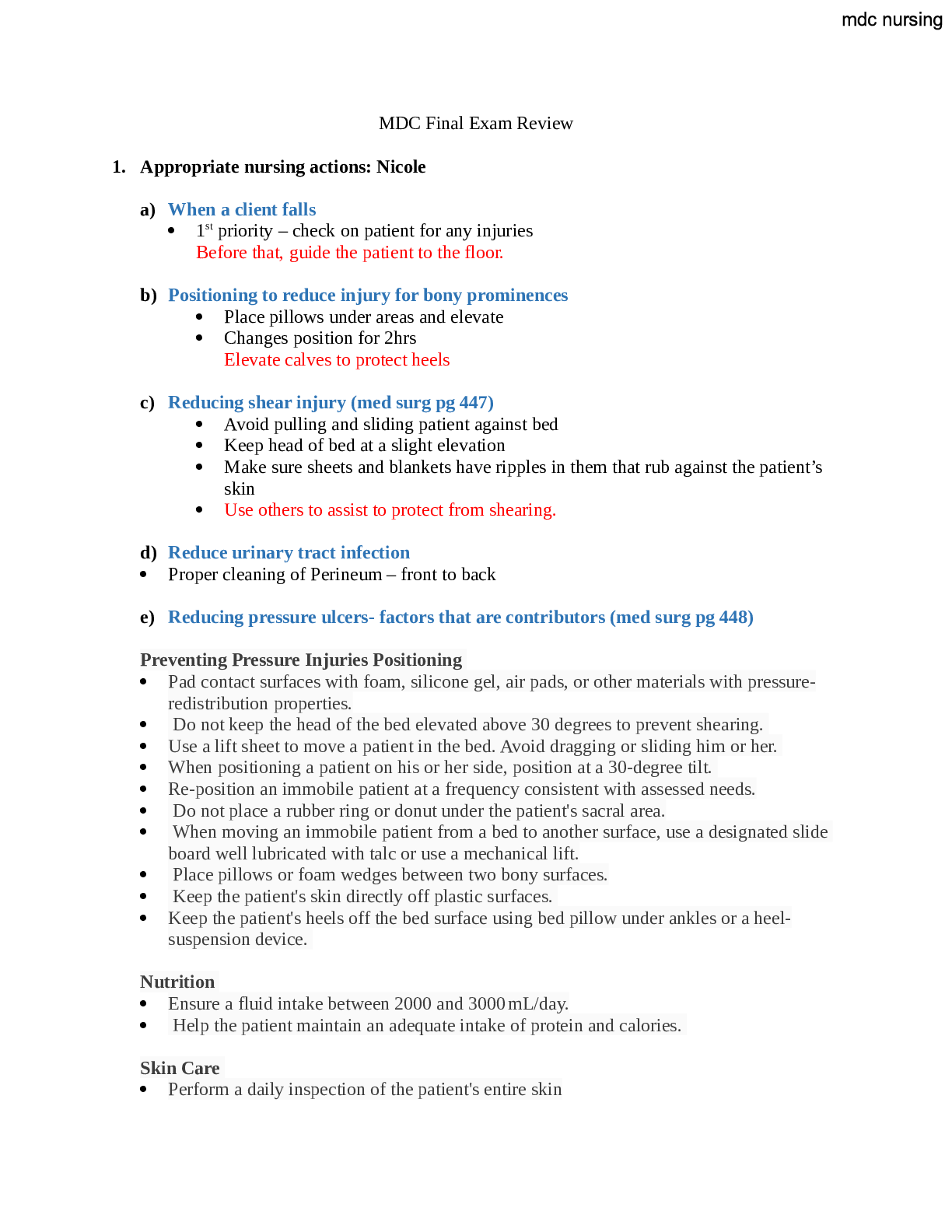
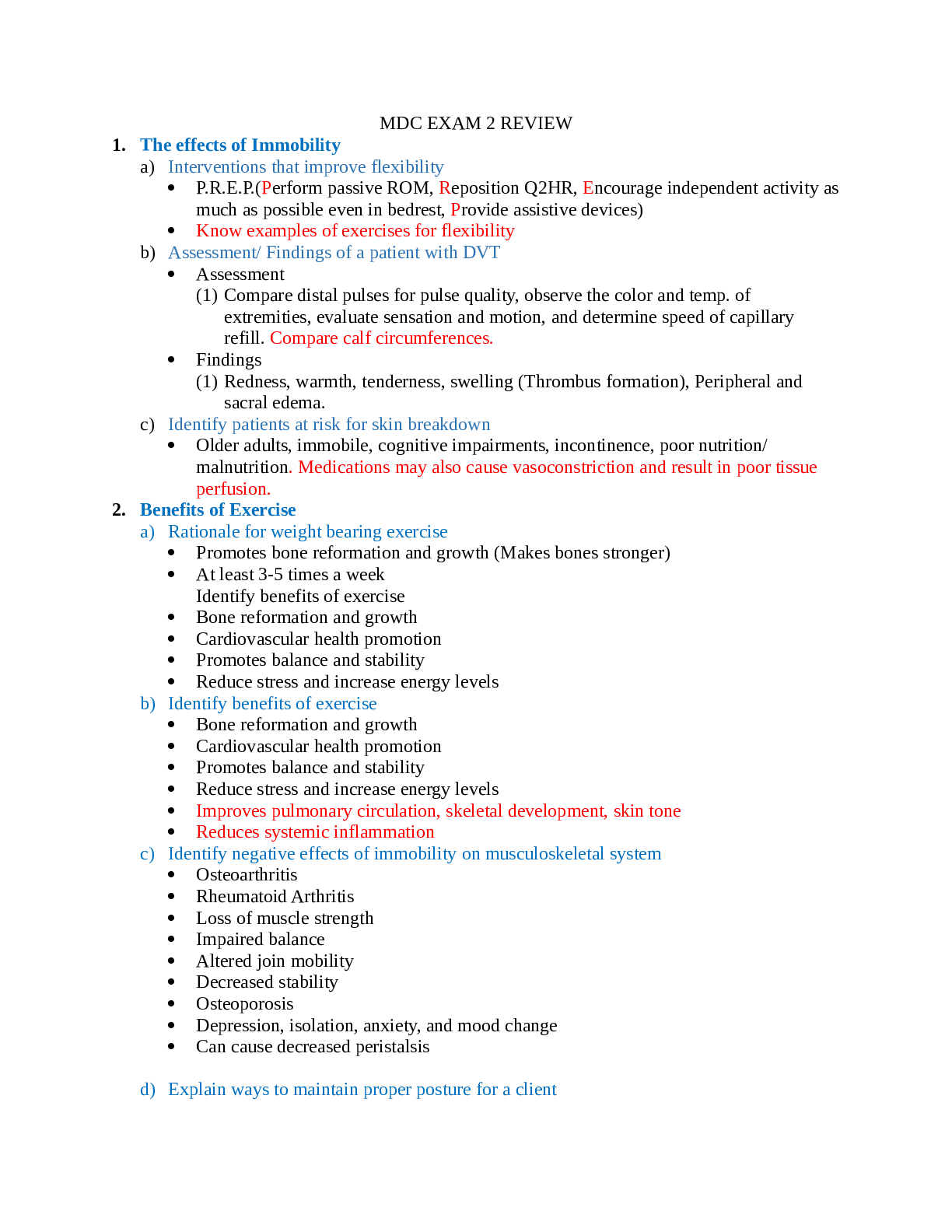


.png)


